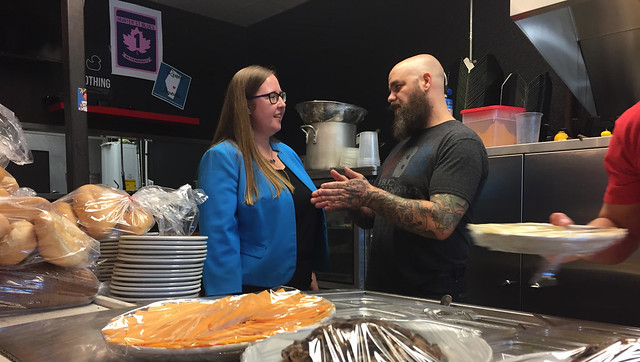This release was issued under a previous government.

Mark Bellows, co-owner of The Local Omnivore, explains the benefits of paying his workers a fair wage.
As the province’s economy continues to recover, Alberta’s lowest-paid workers will see their hourly wage increase to $13.60 from $12.20. This is the third step in the Government of Alberta’s gradual phase-in of a $15-per-hour minimum wage by Oct. 1, 2018.
“All hard-working people deserve to earn enough money to support themselves and their families. Our government is staying true to our commitment to make life better for those Albertans who earn the bare minimum. This increase will boost the spending power of low-income people, which supports Alberta’s economic recovery.”
“Providing our employees with more than minimum wage for me is a personal decision – and it’s a moral decision. From a business standpoint, it’s about trying to make our company stronger by being responsible and providing income security for our employees. By paying them more, you respect their time and you also respect your business’ bottom line.”
"Low-wage earners are predominantly female, over the age of 20 and employed in full-time permanent positions. Reducing poverty and income inequality is an important reason to stick with the commitment to increase the minimum wage to $15 in October 2018. Just as important is ensuring that low-income working Albertans are able to earn enough to pay for basic expenses."
Alberta low-income earner facts
- More than 292,000 Albertans earn less than $15 per hour.
- More than 59 per cent of low-income earners are women.
- Over half work full time and 79 per cent have permanent jobs.
- Almost 40 per cent have children, meaning there are more than 115,000 working parents earning $15 per hour or less.
- The main industries that employ minimum-wage and low-wage earners are accommodation and food services, retail trade and other services such as repair and maintenance.
The annual gross income for full-time minimum wage earners will rise to $28,288 from $25,376. The weekly minimum wage for some salespersons, land agents and other professionals will rise to $542 from $486. The monthly minimum wage for domestic employees who live in the employer’s residence will rise to $2,582 from $2,316.
The increase will mean low-wage Albertans have more money to spend on their basic needs, such as housing, transportation, school supplies, clothing and groceries. This increased spending power, in turn, helps stimulate our economy. Employers will also benefit from increased employee productivity and job satisfaction, as well as decreased turnover and training costs.
Economic recovery indicators
- Alberta continues to have the highest employment rate in Canada and the highest weekly earnings.
- Retail sales in Alberta were at $6.8 billion in July 2017 – higher than the pre-recession peak of $6.7 billion in Oct. 2014.
- Restaurant receipts reached a record high in July 2017, when Albertans spent $770 million at restaurants and bars across the province.
- In 2016, private sector investment in Alberta was 2.5 times higher than the national average.
- In the first seven months of 2017:
- Alberta goods exports are up 40.1 per cent to $58.9 billion over the same period in 2016.
- Alberta has exported more than $75 million worth of goods to 20 countries, up from 16 in 2016.
- Alberta accounted for more than 55 per cent of Canada’s entire exports increase compared with the same period in 2016.
- Alberta goods exports to the U.S. have increased over 44 per cent compared with the same seven months in 2016.
Employers and employees with questions about minimum wages can contact the Employment Standards Contact Centre at 780-427-3731, or toll-free at 1-877-427-3731, or visit work.alberta.ca/es.